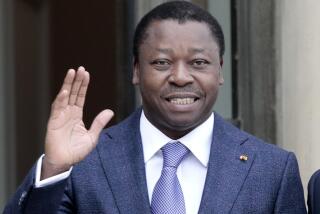Changes in Guinea
- Share via
I commend The Times for your coverage of the democratization movement and political change in Africa, including your survey article (“Democracy and Despots: The State of Government in Black Africa,” World Report, Aug. 13). It is satisfying to see that Americans are beginning to acknowledge the profound political and economic changes under way in Africa.
I was very disappointed, however, at your inaccurate characterization of Guinea’s democratic evolution, and particularly your description of Guinea as “probably not serious about reform.” Under the leadership of President Lansana Conte, Guinea initiated political reform in 1985 (well before most of Eastern Europe). This process culminated last December in a national referendum that overwhelmingly approved a new constitution, which includes election of a president by universal suffrage, an elected legislature, an independent judiciary and a clear separation of powers.
As the first step in instituting this constitution, President Conte in February replaced the former ruling military committee with the Transitional Committee for National Recovery, which will oversee multiparty presidential and legislative elections. Freely contested municipal elections were held throughout Guinea in June.
At the same time, for the past five years Guinea has been enacting a broad range of economic reforms intended to encourage the private sector and facilitate foreign investment. We have no doubts that democracy and free-market economics go hand in hand.
Guineans are pleased to see democratization spread throughout Africa. And we are proud that in Guinea, democratization has not evolved as a result of demonstrations and violence, but through a steady, deliberate process which has been embraced by the vast majority of our citizens.
ANSOUMANE CAMARA
Ambassador
Washington, D.C.
More to Read
Sign up for Essential California
The most important California stories and recommendations in your inbox every morning.
You may occasionally receive promotional content from the Los Angeles Times.












